
Postepy Dermatologii i Alergologii
Scope & Guideline
Innovating research in Dermatology and Immunology.
Introduction
Aims and Scopes
- Dermatological Conditions and Treatments:
The journal publishes research on a variety of dermatological conditions, including psoriasis, atopic dermatitis, eczema, and skin cancers. It emphasizes the exploration of novel treatments, including biologics and immunotherapy. - Allergy and Immunology:
Research articles focus on allergic diseases, including allergic rhinitis, food allergies, and drug allergies, highlighting their epidemiology, pathophysiology, and management strategies. - Microbiome and Skin Health:
There is a notable interest in the relationship between the skin microbiome and dermatological conditions, exploring how microbial communities influence skin health and disease. - Quality of Life and Patient-Reported Outcomes:
The journal addresses the impact of skin diseases on patients' quality of life, incorporating studies that assess patient-reported outcomes and psychosocial factors. - Innovative Diagnostic and Therapeutic Techniques:
The journal publishes studies on cutting-edge diagnostic methods, such as reflectance confocal microscopy and teledermatology, as well as novel therapeutic approaches like nanotechnology and biological treatments.
Trending and Emerging
- Biologics and Immunotherapy in Dermatology:
There is a growing body of research focused on the use of biologics and immunotherapy for treating chronic skin diseases, particularly psoriasis and atopic dermatitis, indicating a shift towards personalized medicine. - Impact of the Microbiome on Skin Conditions:
Emerging studies are increasingly investigating the role of the skin microbiome in health and disease, emphasizing the need for a holistic approach to dermatological treatment. - Mental Health and Dermatology:
Research exploring the psychological aspects of dermatological diseases, including anxiety and depression in patients with chronic skin conditions, is gaining prominence. - Teledermatology and Digital Health:
The COVID-19 pandemic has accelerated interest in teledermatology and digital health solutions, with numerous studies evaluating their effectiveness and patient satisfaction. - Comorbidities in Dermatological Conditions:
There is a rising trend in research exploring the associations between skin diseases and systemic conditions, such as metabolic syndrome and cardiovascular diseases.
Declining or Waning
- Traditional Pharmacotherapy:
There has been a noticeable decrease in studies focusing solely on traditional pharmacotherapy for skin conditions, with a shift towards biologics and targeted therapies. - Basic Science Research:
Research that delves deeply into basic science mechanisms without immediate clinical applications appears less frequently, as the journal increasingly emphasizes translational research. - Aging and Dermatology:
While aging-related skin conditions remain relevant, the volume of research specifically addressing geriatric dermatology issues has diminished compared to other emerging themes. - Environmental Dermatology:
Research specifically addressing environmental factors affecting skin diseases, such as climate change impacts, has seen a decline in publication frequency. - Conventional Diagnostic Techniques:
There is a waning focus on conventional diagnostic techniques, as more innovative methods gain traction in recent publications.
Similar Journals

Frontiers in Allergy
Innovating solutions for allergy management.Frontiers in Allergy is a pioneering open-access journal published by FRONTIERS MEDIA SA, dedicated to advancing the frontiers of research in the fields of Immunology and Infectious Diseases. Launched in 2020 and based in Lausanne, Switzerland, this journal provides a dynamic platform for researchers, professionals, and students to share innovative findings and insights related to allergic disorders and their broader immunological implications. With a respectable Q2 ranking in both Immunology and Allergy and Infectious Diseases categories, as well as being indexed in Scopus, this journal is emerging as a significant resource for the scientific community. The open-access model ensures wide dissemination of valuable knowledge, facilitating collaboration and breakthroughs in treatments and understanding of allergies and related conditions. Frontiers in Allergy invites contributions that drive forward the understanding of immune responses, allergy prevention, and management, solidifying its role as a crucial player in the sustainability and growth of health sciences.

Asia Pacific Allergy
Transforming Allergy Care Through Collaborative ResearchAsia Pacific Allergy, published by Lippincott Williams & Wilkins, is a prominent academic journal dedicated to advancing research and clinical practice in the fields of dermatology, immunology, and allergy. With its ISSN 2233-8276 and E-ISSN 2233-8268, the journal provides a platform for innovative studies and reviews that cater to an international audience of researchers, healthcare professionals, and students involved in allergy and related disorders. Although it does not currently offer open access to its publications, the journal's robust output from 2015 to 2017 and its ongoing contribution to the literature from 2021 to 2024 showcase the evolving landscape of allergy research in the Asia Pacific region. Recognized in the 2023 Journal Citation Reports, it holds a Q2 ranking in Dermatology and a Q3 ranking in Immunology and Allergy, while its Scopus ranks further emphasize its significance within these domains, positioning it among the top journals in the field. As a source of cutting-edge research, Asia Pacific Allergy plays a vital role in fostering collaboration and knowledge dissemination, ultimately assisting in the betterment of patient care and treatment strategies across the region.
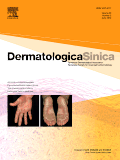
Dermatologica Sinica
Elevating Dermatology: Where Research Meets Real-world ImpactDermatologica Sinica, published by Wolters Kluwer Medknow Publications, is an esteemed open-access journal in the field of dermatology that has been disseminating critical research since its inception in 2005. With an E-ISSN of 2223-330X and an ISSN of 1027-8117, this journal presents a platform for researchers, clinicians, and students to share cutting-edge findings and advancements in dermatological science. As of 2023, it proudly ranks in the Q2 category of dermatology journals and holds a notable position at rank #62 out of 142 in the Scopus Medicine - Dermatology category, placing it in the 56th percentile for impact. The journal transitioned to an open-access model in 2016, enhancing accessibility and visibility for groundbreaking studies worldwide. With a commitment to fostering innovation in the dermatological community, Dermatologica Sinica aims to advance the understanding and treatment of skin diseases while encouraging scholarly dialogue among practitioners and researchers across the globe.
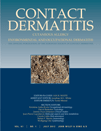
CONTACT DERMATITIS
Empowering Clinicians with Cutting-Edge ResearchCONTACT DERMATITIS, published by WILEY, is a leading international journal focused on the vital field of dermatology, particularly examining the diagnosis, treatment, and management of contact dermatitis and related skin conditions. With origins dating back to 1975 and a planned convergence period extending to 2024, this esteemed journal serves as a crucial resource for researchers, clinicians, and healthcare professionals dedicated to advancing knowledge in dermatological practices. In the latest rankings, it has achieved a commendable Q2 classification in Dermatology and Q3 classification in Immunology and Allergy for 2023, underscoring its significance within these dynamic fields. Moreover, it holds a notable ranking of #29/142 in Medicine & Dermatology and #130/233 in Medicine & Immunology and Allergy according to Scopus metrics, placing it in the top tier of scholarly publications. While the journal operates on a subscription basis, its comprehensive reviews, original articles, and insightful research findings are invaluable for pushing the boundaries of current dermatological and immunological knowledge. By fostering a deeper understanding of the complexities of skin reactions and their implications, CONTACT DERMATITIS plays a vital role in connecting research with clinical practice, making it an essential read for anyone engaged in the field.
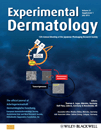
EXPERIMENTAL DERMATOLOGY
Fostering Breakthroughs in Skin Health ResearchEXPERIMENTAL DERMATOLOGY, published by WILEY, is a leading journal in the fields of Biochemistry and Dermatology, with impressive rankings including Q1 status in both categories as of 2023. With its ISSN 0906-6705 and E-ISSN 1600-0625, the journal offers a reputable platform for disseminating cutting-edge research and insights into skin biology and related health issues. As a pivotal resource for professionals, researchers, and students alike, EXPERIMENTAL DERMATOLOGY includes a broad scope of topics, fostering a deeper understanding of dermatological conditions and enhancing new therapeutic strategies. The journal’s distinguished performance is highlighted by its Scopus rankings, which place it at the 91st percentile in Medicine-Dermatology and the 65th in Biochemistry. While not an open-access publication, the journal remains committed to ensuring the accessibility of crucial developments within the dermatological community worldwide, facilitating the advancement of both clinical practice and academic inquiry.
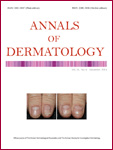
Annals of Dermatology
Transforming the landscape of dermatological knowledge.Annals of Dermatology is a prestigious academic journal published by the Korean Dermatological Association, focusing on the latest research and advancements in the field of dermatology. With a commitment to advancing knowledge in skin health and disease, this journal serves as a vital resource for researchers, clinicians, and students working in dermatology and related disciplines. Since its inception in 1989, it has evolved to consolidate its position in the academic community, boasting a Q2 ranking in the 2023 Dermatology category and a Scopus rank of #87 out of 142, placing it in the 39th percentile. Although it operates under a subscription model, the journal's impact factor reflects its significance in advancing dermatological research, attracting innovative studies and reviews that shape clinical practice. With a publication history extending from 1989 to 1996 and then from 2008 to the present, Annals of Dermatology continues to be an essential publication for those devoted to improving skin health.
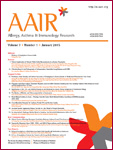
Allergy Asthma & Immunology Research
Pioneering research for a healthier tomorrow.Allergy Asthma & Immunology Research, published by the Korean Academy of Asthma Allergy & Clinical Immunology, is a leading journal dedicated to advancing the fields of immunology, allergy, and respiratory medicine. With an ISSN of 2092-7355 and an E-ISSN of 2092-7363, this esteemed publication has been a cornerstone for researchers and practitioners since its inception in 2009 and continues to disseminate critical findings through till 2024. The journal is ranked in the Q3 category in Immunology and the Q2 category in Immunology and Allergy as well as Pulmonary and Respiratory Medicine, illustrating its impact in these vital fields. With a solid Scopus ranking in multiple sub-disciplines, the journal not only contributes to the scientific discourse but also promotes innovative research and clinical practices. Although currently operating without an open access model, the journal remains highly regarded for its thorough peer-review process and commitment to academic excellence, making it an essential resource for professionals, researchers, and students passionate about advancing knowledge in allergy, asthma, and immunology.
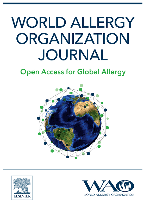
World Allergy Organization Journal
Elevating Standards in Allergy Research and TreatmentWorld Allergy Organization Journal is a premier open-access publication dedicated to advancing the understanding and treatment of allergic diseases and related conditions. Published by ELSEVIER, this journal boasts a commendable impact factor and ranks in the second quartile for both Immunology and Allergy, as well as the first quartile in Pulmonary and Respiratory Medicine. Since its inception as an open-access journal in 2008, it has consistently aimed to provide a credible platform for researchers, clinicians, and students to disseminate original research, reviews, and clinical studies. With its emphasis on high-quality scholarship and practical applications, the World Allergy Organization Journal plays a crucial role in bridging theoretical knowledge with clinical practice, making significant contributions to the fields of immunology, allergy, and respiratory medicine. The journal is particularly notable for its accessibility to a global audience, exemplified by its open-access model since 2008, promoting a wider exchange of ideas and innovations across borders.

Current Opinion in Allergy and Clinical Immunology
Advancing knowledge for better patient outcomes in immunology.Current Opinion in Allergy and Clinical Immunology, published by Lippincott Williams & Wilkins, is a pivotal journal that serves as a key resource for professionals in the fields of immunology and allergy. With an ISSN of 1528-4050 and an E-ISSN of 1473-6322, this journal presents cutting-edge reviews of the latest research findings, methodologies, and therapeutic approaches in the management of allergic and immunological disorders. With a Q3 category ranking in both Immunology and Allergy for 2023, and a Scopus rank of #103 in Immunology and Allergy, it reflects a solid position within the scientific community. Operating in the highly dynamic fields of immunology and clinical practice since its inception in 2001, the journal aims to harmonize emerging research trends with clinical applications to enhance patient outcomes. Although it does not currently offer Open Access options, the journal's substantial impact factor attests to its significance as a scholarly resource. By disseminating high-quality reviews and expert opinions, Current Opinion in Allergy and Clinical Immunology continues to foster knowledge advancement and professional development among researchers, practitioners, and students alike.
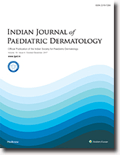
Indian Journal of Paediatric Dermatology
Exploring breakthroughs in paediatric dermatology.Indian Journal of Paediatric Dermatology (ISSN: 2319-7250; E-ISSN: 2319-7269), published by Wolters Kluwer Medknow Publications, stands as a pivotal resource in the specialized field of paediatric dermatology. As a peer-reviewed open access journal since 2013, it aims to disseminate cutting-edge research, clinical practices, and innovative developments that cater to the specific dermatological needs of children. The journal provides an essential forum for collaboration among researchers, clinicians, and students, facilitating the sharing of knowledge on a wide array of topics, including skin conditions unique to paediatric populations, treatment methodologies, and advancements in dermatological care. With a commitment to enhancing the understanding and treatment of paediatric skin diseases, this journal plays a critical role in shaping best practices and informing future research directions in a rapidly evolving field.